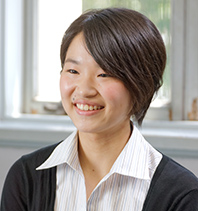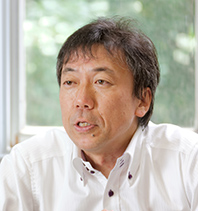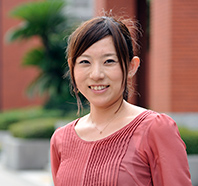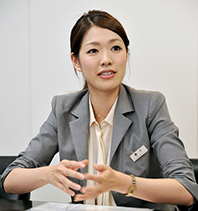All You Need to Know About Internships (3)
Report 2: Faculty of Letters "Practicum in Library and Information Services"
Practical experience turns knowledge into know-how
Recognized as part of the formal curriculum, practicums are aimed at allowing students to build up practical experience as they prepare to acquire certification. Although practicums are somewhat different to internships, which give students experience of employment at a company or organization, they share a common purpose: providing hands-on experience. There are a number of different practicums offered at Keio. Let's start by looking at the "Practicum in Library and Information Services" at the Faculty of Letters and the experiences of one student on the course.


Taking a practicum is not generally required in order to qualify as a librarian. However, the Keio University Faculty of Letters' major in Library and Information Science includes a compulsory practicum to allow students to further develop their skills. At present there are 19 host organizations for the practicum, including public libraries, university libraries, school libraries, and specialized libraries such as company archives.
Professor Kazuaki Kishida, who supervised the "Practicum in Library and Information Services I/II" courses up until this March, explains the benefits: "Students have the opportunity to apply the knowledge and skills learned in lectures to real-life situations. This helps them to gain a deeper understanding and renew their approach to their studies."
Hiroko Sato, a fourth-year Library and Information Science major, took part in a practicum offered by Yokohama City Libraries in her summer vacation last year. "Concepts that were difficult to grasp in class suddenly made a lot of sense in a practical context," she says of her experience.
Sato spent the first three days of the two-week practicum attending lectures at the Yokohama City Central Library on such topics as the role of public libraries, after which she worked as a librarian at Kohoku Library.
"I was reminded of the important role that public libraries have to play as an integral part of the community to provide resources for all kinds of different people. As well as working at the loans counter, processing book loans and returns, I helped create online catalogs for the collections, organize the book stacks, and assist people to search for materials. Storytelling for children was particularly memorable. It was a special experience for me to see how much they enjoyed it. I realized that ensuring each user is happy is one of the most fulfilling aspects of a librarian's job."
Report 3: Internships: A student's impressions
Envisioning the concept of work through hands-on experience
Risa Amagasu, a fourth-year Environment and Information Studies major, took part in a two-week internship run by Yokohama City in her summer vacation. Amagasu describes her experience and how her newfound understanding of work benefited her when job hunting.

I applied for the Yokohama City internship because I am really fond of Yokohama, the city where I was born and raised. I was assigned to the ward administration section of Sakae Ward Office. What really surprised me was that the section that hosted me let me take responsibility for my own projects, rather than treating me like a student—they even prepared business cards for me.
I took a central role in organizing a project to make a promotional television program about Sakae Ward, attending meetings with representatives at the filming locations, coordinating with the creative staff, and reporting on the progress of the script to the ward mayor. The other staff gave me enthusiastic guidance, and while they were always on hand if I needed support, they encouraged me to take my own initiative.
I also spent some time working at the general information counter of the ward office. The staff there taught me that first and foremost it is important to reassure the many people who come to the ward office to deal with problems or concerns. I felt that I was able to get a glimpse of the true nature of public administration.
I was considering applying to become a civil servant, but in the end I decided to work for a private communications company. The internship proved to be extremely beneficial for me as it allowed me to get a clearer picture of what it means to "work." Most days I would arrive at the office at the designated time, attend meetings, plan work and carry it out according to schedule, go to lunch, back to work. Some days I might even work overtime. Experiencing this daily routine and what it is like to work was very useful when it came to applying for jobs, because it made me consider carefully such factors as the working environment and the employee benefits available for important life events such as marriage and childbirth.
Column Internships: An employer's impressions

Mitsukoshi Isetan offers various internships every month. In the summer, around 50 people took part in internships over a three week period. Many Keio students also take part in our internships.
The internships give participants a taste of the wide variety of work that goes into running a department store, from customer service on the shop floors, to the merchandise division purchasing items for sale and carrying out planning and development, or the advertising division in charge of promotion and planning and creating advertising campaigns. Participants have a variety of opportunities to learn, including at social gatherings and group work with other staff. Former participants have commented that they were able to rediscover their strengths and shortcomings, which they found useful when job hunting.
We hope that the internship will help everyone who takes part to discover not only what it means to work but also just how varied the roles available at a department store are. This project is supported by our company culture, which encourages us to always take on new challenges. We believe that internships have a positive influence not only on the students who take part but also the staff and the workplace that supervises them.
If we ask one thing of the students who take part, it is to think and act for themselves. There is no such thing as being too proactive, so feel free to use your initiative.
According to a survey in the 2011 academic year, over 20 internships and practicums are offered as undergraduate courses at Keio University. With more than 2500 students registered for such courses, this indicates that 1 in every 11 Keio undergraduates has taken part in one of these internships or practicums. At the same time, many of these courses are compulsory practicums for medical students, and many students have taken more than one course.
Courses focused on practical application, such as "Surgery" at the School of Medicine, the "Practicum in Acute Care" at the Faculty of Nursing and Medical Care, and the "Hospital Practicum" at the Faculty of Pharmacy, encourage students to acquire specialist skills and knowledge through hands-on experience. As for courses in other fields, in addition to the "Library Practicum" described above, around 140 Keio students took the "Practice in Teaching" module, the official practicum for the Teacher Training Course.
Internships offered as courses at Keio include the "Dialogue with Society" course at the Faculty of Business and Commerce described in the previous installment of this series, and the "Internships in Business" and "Internships in Public Organizations" courses at the Faculty of Policy Management and the Faculty of Environment and Information Studies.
*This article appeared in the 2013 autumn edition (No.280) of “Juku”.
*Position titles, etc., are those at the time of publishing.
